|
|
|
Sort Order |
|
|
|
Items / Page
|
|
|
|
|
|
|
| Srl | Item |
| 1 |
ID:
087435
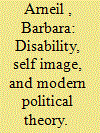

|
|
|
|
|
| Publication |
2009.
|
| Summary/Abstract |
Charles Taylor argues that recognition begins with the politics of "self-image," as groups represented in the past by others in ways harmful to their own identity replace negative historical self-images with positive ones of their own making. Given the centrality of "self image" to his politics of recognition, it is striking that Taylor, himself, represents disabled people in language that is both limiting and depreciating. The author argues such negative self-images are not unique to Taylor but endemic to modern political thought from John Locke to John Rawls, as the disabled ("irrational" and/or mentally disabled/ill people) are constituted in direct opposition to the rational person and/or citizen. Using contemporary social theories of disability, as articulated by disabled scholars and advocates, the author concludes that such negative self-images (and the binary of autonomy/justice and dependency/charity underpinning them) must be purged from political theory and replaced with an alternative theory of personhood/citizenship rooted in the image of interdependency.
|
|
|
|
|
|
|
|
|
|
|
|
|
|
|
|
| 2 |
ID:
085426
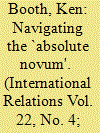

|
|
|
|
|
| Publication |
2008.
|
| Summary/Abstract |
This article situates John Herz's work within the perennial debate about realism and idealism, and the issue of whether and how the two sets of ideas can be reconciled. The variety of `realist' and `idealist' concepts and conceptualisations within Herz's work, and his attempt to combine them in an approach he called `Realist Liberalism', reveals the inadequacy of the addiction of many teachers and researchers in academic international relations to stick unhelpful labels on theorists (such as `Realist') who advance complex and sometimes apparently contradictory intellectual positions. Placing Herz's work alongside other theorists who have grappled with the relationships between realism and idealism - notably Carr and Rawls - the article argues for categorising ideas and not individuals. More importantly, a case is made for the continuing validity of seeking to comprehend IR in terms of the interplay of idealism and realism, and for greater recognition of Herz's contribution to it.
|
|
|
|
|
|
|
|
|
|
|
|
|
|
|
|
| 3 |
ID:
155785
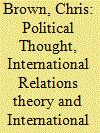

|
|
|
|
|
| Summary/Abstract |
The relationship between political theory, including the history of political thought, and International Relations theory, including the history of international thought, has been, and to some extent remains, complex and troubled. On both sides of the Atlantic, the mid-twentieth century founders of International Relations as an academic discipline drew extensively on the canon of political thought, but approached the subject in an uncritical way, while political philosophers largely disdained the international as a focus. This changed in the 1970s and 1980s, with the emergence of the ‘justice industry’ based on critiques of Rawls’ A Theory of Justice and a consequent recovering of the past history of cosmopolitan and communitarian thought. A new discourse emerged in this period – International Political Theory – bridging the gap between political thought and international relations and stimulating a far more creative and scholarly approach to the history of international thought. However, in a social science environment dominated by the methods of economics, that is, formal theory and quantification, the new discourse of International Political Theory occupies a niche rather than existing at the centre of the discipline.
|
|
|
|
|
|
|
|
|
|
|
|
|
|
|
|
| 4 |
ID:
127007
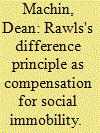

|
|
|
|
|
| Publication |
2013.
|
| Summary/Abstract |
Outside academia, John Rawls's theory of justice-justice as fairness-has had little impact. This article is part of a broader project to rectify this. I offer a distinctive, second-best, argument for Rawls's difference principle. The difference principle requires that inequalities in income and wealth are justified only if they benefit society's least-advantaged citizens. My paper argues that, slightly-modified, the difference principle is an excellent principle of redress in light of the UK's continued failure to give all citizens fair career chances. I show how we might realize the difference principle at the level of policy through tax rate reductions or negative tax rates. I conclude that if you don't want to accept the second-best argument for the difference principle you must get serious about giving all citizens fair career chances. As I suggest, this task is extremely difficult.
|
|
|
|
|
|
|
|
|
|
|
|
|
|
|
|
| 5 |
ID:
176537
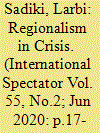

|
|
|
|
|
| Summary/Abstract |
At the core of “disembedded regionalism” in the Gulf Cooperation Council (GCC) is an incapacity to foster more representative forms of politics that are responsive to citizens. Instead, elite-to-elite relations are a salient feature that characterises Gulf politics. A radical re-reading of Jürgen Habermas and John Rawls, applied to the GCC in the first two decades of the 21st century, confirms that top-down management of politics is conducive to conflict and disintegration as against integration, marginalising the agenda of multi-level governance within the subregion. Set against the backdrop of the current blockade/crisis, this critical rendition throws into sharp relief the non-democratic brand of GCC regionalism.
|
|
|
|
|
|
|
|
|
|
|
|
|
|
|
|
|
|
|
|
|